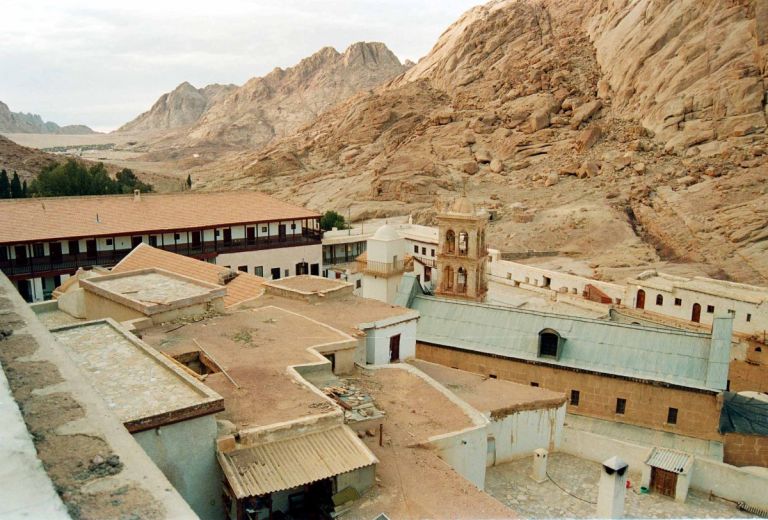Crisis at Mount Sinai: Ecclesiastical Coup Casts Shadow Over Sacred Monastery

Πηγή Φωτογραφίας: ΑΙΓΥΠΤΟΣ ΣΙΝΑ (ΦΩΤΟ ΑΡΧΕΙΟ) Η ΙΕΡΑ ΜΟΝΗ ΤΗΣ ΑΓΙΑΣ ΑΙΚΑΤΕΡΙΝΗΣ ΕΧΕΙ ΥΠΟΣΤΕΙ ΑΠΟ ΤΟΝ ΧΡΟΝΟ ΦΘΟΡΑ ΜΕ ΑΠΟΤΕΛΕΣΜΑ ΣΕ ΠΕΡΙΠΤΩΣΗ ΣΕΙΣΜΟΥ ΝΑ ΚΙΝΔΥΕΥΕΙ ΝΑ ΥΠΟΣΤΕΙ ΣΟΒΑΡΕΣ ΖΗΜΙΕΣ ΑΚΟΜΑ ΚΑΙ ΜΕΡΙΚΗ ΚΑΤΑΡΕΥΣΗ ΟΠΩΣ ΤΟ ΕΣΩΤΕΡΙΚΟ ΤΟΥ ΝΑΟΥ ΚΑΙ Η ΠΕΡΙΦΗΜΗ ΤΟΙΧΟΓΡΑΦΙΑ ΤΗΣ ΜΕΤΑΜΟΡΦΩΣΗΣ ΤΟΥ ΣΩΤΗΡΟΣ .
In a monastery considered among the oldest and most revered in the Christian world, the Monastery of Saint Catherine at Mount Sinai, sacred tradition and institutional stability are being put to the test. The Archbishop of Sinai, Pharan, and Raitho, Damianos, has issued a dramatic statement accusing a group of monks of attempting an illegal ecclesiastical coup aimed at removing him from office — a move he describes as leading the monastery into “Babylonian captivity.”
A Canonical Rebellion in the Heart of Orthodoxy
According to Archbishop Damianos, a group of 15 monks convened a clandestine assembly, allegedly bypassing canonical procedures that require at least a two-thirds majority to initiate leadership changes. Their so-called “decision” to dismiss him from the position of Abbot of the monastery has reportedly been sent to the Patriarchate of Jerusalem for ratification, a development his inner circle is calling an ecclesiastical insurrection with broader implications.
This schism isn’t just a matter of church governance; it unfolds at the intersection of spiritual legitimacy, regional power balances, and religious diplomacy. With the Patriarchate of Jerusalem’s response still pending, the move could severely strain relationships between the Orthodox Church and both the Greek state and the Egyptian authorities.
Geopolitical Reverberations and Legal Battles
This internal rebellion comes amid a long-standing legal and diplomatic battle over the monastery’s status. Since 2012, Egyptian local authorities have sought to challenge the historical autonomy of the monastery, triggering a decade-long judicial saga. A recent decision by the Ismailia Court of Appeal on May 28, 2025, is viewed by Archbishop Damianos as a direct threat to the monastery’s continued existence.
Despite the challenges, recent progress — including the drafting of a Greek law granting legal personality to the monastery’s representation in Greece, with unanimous support from all Greek political parties — had rekindled hope for a resolution. That hope now risks being undermined by internal fragmentation.
A Battle for the Soul of Sinai
In his emotionally charged statement, the 91-year-old Archbishop evokes language that blends theological urgency with political gravitas, warning of betrayal, ambition, and manipulation. “They are blinded by the passion for power,” he says, invoking Byzantine-era rhetoric to describe what he sees as a coordinated effort to destabilize the monastery from within — just as external support begins to solidify.
He calls this “a coup against the Church”, warning of consequences that extend beyond religious life and into the realm of Greek national identity and cultural unity. His appeal isn’t only to the ecclesiastical hierarchy, but to the wider Hellenic and Orthodox world: “We must not allow the monastery to fall,” he insists, referencing the unprecedented political consensus in the Greek Parliament as a model for unity.
Diplomatic Crossroads
The timing is critical. On August 6, 2025, the Egyptian Foreign Minister is scheduled to visit Athens in what many view as a crucial step toward formalizing a cooperative framework for the monastery’s protection. The success of this visit could depend on the monastery presenting a united front, not one fractured by canonical rebellion.
As such, the attempted coup raises not only ecclesiastical concerns but also geostrategic alarms. The Monastery of Saint Catherine serves as both a spiritual beacon and a diplomatic conduit between Greece and Egypt — and, by extension, between Eastern Christianity and the Arab world.
What’s at Stake
The Monastery of Sinai is not merely a remote religious site — it is an enduring symbol of coexistence, resilience, and spiritual diplomacy. If its internal stability collapses, it could damage much more than ecclesiastical harmony. It could weaken a cornerstone of Hellenic religious diplomacy, erode historical status under UNESCO, and reduce Greece’s soft power influence in a volatile region.
In Damianos’ words, “Let us be inspired by the unity of the Hellenic Parliament. Let us not allow ego and ambition to dismantle what has been preserved for centuries.”
The coming weeks will determine whether Mount Sinai remains a sanctuary of unity — or becomes a battlefield of schism.
Source: pagenews.gr
Διαβάστε όλες τις τελευταίες Ειδήσεις από την Ελλάδα και τον Κόσμο






Το σχόλιο σας